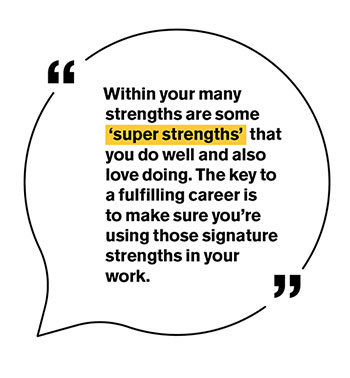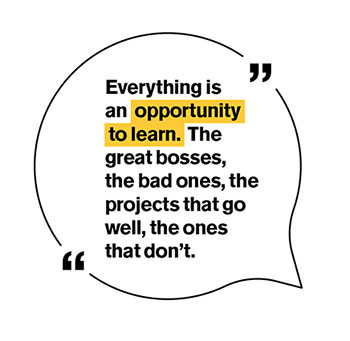Editor's note: This story originally appeared in the fall 2021 issue of ASU Thrive magazine.
May Busch is the former COO of Morgan Stanley Europe, and she’s now an executive coach, speaker, adviser, author and executive-in-residence in ASU’s Office of the President. Find her at maybusch.com/asuthrive.
You’ve just started your career. It’s such an exciting time — and possibly stressful.
There’s a lot of pressure to get it “right,” and it feels like everyone has an opinion. These three principles will help you thrive in whatever career path you choose.
1. Focus on your signature strengths

Within your many strengths are some “super strengths” that you do well and also love doing, when things feel simple, easy and fun.
Sometimes these are so natural you don’t even regard them as real strengths. Like being really good with people and having conversations that land well, or being able to quickly synthesize data.
And if you’re not sure what your strengths are, ask people who know you well, like parents, former professors and teachers, former or current coaches, siblings and friends.
The key to a fulfilling career is to make sure you’re using those signature strengths in the work you’re doing.
What are your strengths and how are you using them?
2. Try different tasks, roles and even jobs to find your passion
You’ve probably heard the advice, “Follow your passion.” While well-meaning, it can cause stress if you’re not sure about your passion.
Finding your passion is a discovery process, and your 20s are a time to try out career options. Even when something doesn’t work out, you’ve gained valuable information on what you don’t want to do. And remember, managers hire people in their 20s for their energy, fresh perspective, thirst for knowledge and ability to grow.
There’s no need to put pressure on yourself to determine the direction of the rest of your career or to compare yourself to others.
If you know what your passion is, follow it. And if not, don’t worry. Trying a range of project types, roles and even jobs can help you to find your passion. Plus, some of us, like me, don’t find one specific passion — and still turn out OK.
Have you already found your passion? Or are you still on your way to discovering it?
3. Be like a sponge

These are your formative years. There are so many new experiences and people around you at this point in your career. Soak everything up.
Everything offers opportunities to learn: the great bosses, the bad ones, the projects that go well, the ones that don’t.
The key is to pay attention to what’s going on around you. Notice what skills are valuable. Think about how you would handle a challenging situation your boss is facing. Look for gaps in the market and new ways to do things.
And then take moments to step back and reflect. When you write down takeaways, it helps cement your learning.
What have you learned from your experiences so far? To what extent are you taking time to reflect on your experiences?
It’s part of the journey
Tap into who you are, what you’re good at and what your values are. Use these as your guide, and know that your journey won’t be the same as anyone else’s.
Remember to enjoy and trust the process and treat yourself with compassion. You’re going to make mistakes along the way, maybe even U-turns. But that’s OK.
Through it all, allow yourself to be authentic. You are enough.
